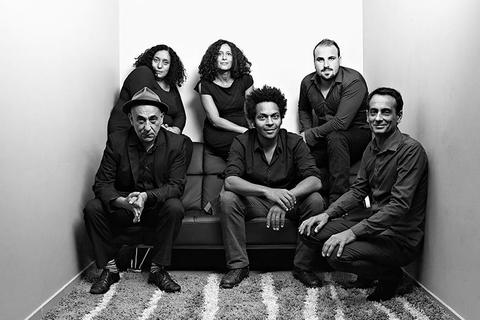Lo'Jo
Listen to La Marseillaise en Créole
Scene one : Night is giving way to a new day. Crickets scratch the satin-dark tropical air. We could be on Reunion Island, in Bamako, deep in the Caucasus, it hardly matters. The voice of Robert Wyatt reads the opening lines: “In the beginning the comets stuttered / Neither fish nor harbour nor clock nor measure / No shelter for the lie / Nor sieve for the gold...”
Then a gentle pulse seeps over the horizon like the dawn. The journey begins. The destinations, the ports and havens of wonder along the way are multi-colored and richly painted. Over an hour later we arrive at scene fourteen, the final act. The song Au Debut, growled in sage tones by singer and composer Denis Péan, brings us back to where we began, to a night that’s giving up its fight with the dawn, to the beginnings of time.
This is Cinema el Mundo. Life’s silver screen. Not world music, but a world full of image, color, sound and story.
2012 is Lo’Jo’s thirtieth year of existence, and Cinema el Mundo is their thirteenth album. The band was born on the margins of Angers, in the west of France. They have stayed on the edges ever since, musically, geographically, philosophically. “To live on the margins is just a way of remaining true to one self,” Péan says.
Their fecund province, with its gentle skies and rolling hills, its marching vineyards and wide lazy rivers is no prison for mind. Anjou has bred big dreams in Lo’Jo, dreams that have transported these musical adventurers to every point of the compass, and back. Their trunk full of sounds and instruments is thickly plastered with the labels of their travels; The southern Sahara, where they helped to organize the very first Festival in the Desert in 2001, and subsequently launch the international career of the Touareg poet-guitarists Tinariwen; Tbilisi and the Caucasus, where their Babel Caucase caravan stopped over en route to Chechnya ; The Reunion Islands in the southern Indian Ocean, just one of Lo’Jo’s many homes from home; not to mention all the places where the band have simply plugged in, to both the local grid and the local human fiesta, and performed…Agadir, Adelaide, Chicago, New York, Buenos-Aires, Katmandou…the list is long and varied, bewilderingly so.
From all these horizons, Lo’Jo bring sounds, instruments, experiences and friends back to the blank canvas of their native land. “I come from a region where there is no specific musical culture, no folklore,” Péan says. “So I make fire out of every kind of wood.” Funk, Gnawa, Electro, Tamashek, Créole, Romany, Maloya, Chanson, Baroque, Berber, Dub, Raga, Slam, Rock…any attempt to define and categorize the Lo’Jo sound quickly degenerates into a fools errand.
Their musical DNA is so complex and intertwined that your only reward for trying to sequence it will only be frustration and sterile science. What matters is the living breathing whole. Lo’Jo sound like the harmony that the builders of Babel Towers sought but never found, like Nino Rota on a non-stop round the world ticket, like the antidote to globalization’s reductive evils, like a hymn to variety, to the human circus in all its incarnations. To listen to one of their albums is to travel with the heart open, always fresh to bittersweet wonders, not possessing but praising, savoring everything along the way.
When Péan sings he could be the shamanic twin of Tom Waits or the Gallic poet brother of Johnny Cash in his late American Recordings phase. Violinist Richard Bourreau brings the rigour of a training at the Angers Conservatoire to the job of arranging and plotting all that chaotic inspiration, of fixing without killing. Bassist and double bassist Kham Meslien and drummer Baptiste Brondy nail down polyglot rhythms only to wrench them free again. The Nid El Mourid sisters, Yamina and Nadia, are the Berber cousins of the B52s, vocalist vagrants roaming the outer fringes of Europe, the lush hills of Georgia, the red dirt roads of Mali and the bare backs of the Atlas Mountains. This sextet is the nucleus around which countless free radicals have orbited for moments of magic during the past three decades; Robert Plant, Robert Wyatt, Tinariwen, Justin Adams, Reunion Island maestro René Lacaille, Georgian panduri legend Nias Diasamidze, cellist Vincent Segal and many more.
The place where Lo’Jo’s strange and unclassifiable musical flora is nurtured and grown is called ‘La Fontaine du Mont’, a huge rambling former farmhouse sitting between two noisy expressways, surrounded by fields not far from Angers. “It’s a cosmopolitan house,” Péan says without a boast, “made in the image of a dream or a utopia just out of reach”.
It’s also where Cinema el Mundo was captured in its entirety and where, to use one of Péan choicest phrases, “sounds were harvested in their moment of grace,” a process deftly facilitated by producer Jean Lamoot. Brought up in Africa, Lamoot is a name to conjure with in his native France, a man who has mid-wifed albums by a jaw-dropping array of talent from Noir Désir to Alain Bashung, Salif Keita, Nneka, Souad Massi, ONB, Mano Negra and Vanessa Paradis. A deep knowledge of African music, rock and chanson made him an ideal choice of producer for Lo’Jo and able to capture the delicate colors, the fragile shapes and shy intricacies of their music.
There at La Fontaine du Mont, in a barn turned studio and musical laboratory attached to the main house, the scenes of Cinema el Mundo took shape. Collaborators came and went, in person or on tape; Menwar , Guo Gan, Andra Kouyate, Vincent Segal, Stephane Coutable, Ibrahim from Tinariwen, Niaz Diasamidze, Robert Wyatt, with their strange menagerie of instruments, their little glass shards of color and sound, all welcomed and seduced by atmosphere of Lo’Jo’s home base. To Péan, Robert Wyatt was something of a returning hero. “The album Rock Bottom left an indelible mark on my adolescence,” he says. “It’s like a spring that is never exhausted, a great big gift of existence.”
And over the music, Péan painted his words, which, to him, are like “the fossils of signs and symbols preserved in the amber of a song.” In Denis Péan, France has something of a Loire valley Pablo Neruda or Dylan Thomas, whose Llaregub Hill is the entire world.
Half of Lo’Jo’s magic lives in their lyrics, a fact which presents a fair challenge to those who barely scraped through their French exams at school. But it’s a mountain worth the climb, the key to Lo’jo’s inner sanctum.
It’s the place where Cinema el Mundo was born, shot by shot, take by take, scene by scene. Have a little patience and Lo’Jo will take you there.
















